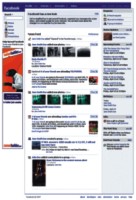|
Trends
When Facebook went Far Beyond our Faces
Ashna Ali
 |
Mark Zuckerberg, the creator of Facebook |
A day after my brother proposed to his girlfriend, she sat on our couch and called her friends to tell them the news. Squealing women excitedly congratulated her on the other end of the phone, and their glee was always punctuated with the same, seemingly absurd question: “Is it Facebook official?”
Online social networks have rendered social worlds almost more relevant on the World Wide Web than in real life. As with every generation, today's youth speaks a language of its own, peppered with pop cultural references and colloquialisms associated with particular social practices. Instant messaging abbreviations have for years now made their way into spoken conversation, and now Facebook and Myspace commands have joined them, bringing with them a more concrete way to assess the degree of closeness within certain relationships: You are not actually my friend if we're not friends on Facebook. In the mean time, there are plenty of people who are friends on Facebook who have never met in real life, interested in one another because of shared interests, mutual friends, or attractive profile pictures.
 |
A sample facebook profile |
Facebook was started by Harvard University student Mark Zuckerberg, modeled after the paper facebooks produced by many universities, listing the names, graduating years and majors of students and staff at a particular university with a thumbnail picture included. The website was launched on February 4, 2004 and originally restricted to Harvard students. It's popularity soon allowed for its expansion to all Ivy League Universities within two months, followed rapidly by many individual universities over the next year. It is now available to anyone with an email address, and networks include geographic locations, high schools and places of employment, allowing members to trace connections with the friends they make in ways that not all online social networks offer.
The flexibility of the internet has allowed the idea of a facebook to take on a whole slew of uses with which its paper inspiration could not possibly compete. Each Facebook profile has a profile picture that can be changed at will, and lists information about the person including their name, year, birthday, major, hometown, employment information, interests, activities, favourite books, movies, quotes and relationship status. It comes with a wall, where friends can post messages, and its own separate email message system for more private communication. Members can upload albums of pictures, and allow friends to comment on them and be “tagged” so that pictures uploaded by others can appear on the profile of those in them. Groups can also be created where those sharing the same interests can belong to a community, and students can also advertise parties and use the website to invite their friends. All this is only the tip of the iceberg.
 |
People spend an average of 20 minutes a day on Facebook |
Socialising and entertainment has been largely digitised parts of life for some years now, but the enormity of the Facebook phenomenon really struck the world when its power as a commodity was understood and advertised in the business sector. As of July 2007, the website has the largest number of registered users among college-focused sites, with 30 million members worldwide. It is the second most visited website on the web. Banner-ads and sponsors are rumoured to rake in more than $1.5 million a week, and large corporations are now seeking to purchase the holders of an entire generation's social world. Potential acquisition of the site always seems to be under negotiation, and petitions have appeared on the site to gain support from members to prevent it. (As they did when Facebook was only negotiating the accessibility to those outside of college networks, starting with high school students.) Zuckerberg reportedly turned down an offer of $750 million, and that the asking price was as high as $2 billion. Arrangements were made between Facebook and other companies to produce additional revenue, resulting in several of the recently added applications, including a promotion with Itunes in which members of the Apple Students group would receive a free 25 song sampler each week until September 30 to ellicit student enthusiasm with each service as fall classes approach. Facebook now also allows for the import of other blogging services such as LiveJournal, Blogger and Xanga. Other developers' work is now featured on Facebook, allowing members to show where they have been in the world on a world map, clicking on countries they have visited and lived in, or posting personality profiles and online test results on their profile. The addition of free classified advertisements competes with online companies such as Craigslist, given the wider existing user base.
When NewsCorp purchased the other popular online social network, MySpace, in 2006 more rumours surfaced of Facebook's purchase. Zuckerberg insists that he will prevent all sales to large media companies, turning down offers as high as $1 billion from Yahoo! Google, after the purchase of YouTube, offered $2.3 billion and rumours continue to surface of other large media corporations offering large premiums for the site.
While the ease with which people can now connect is one of the most culturally and technologically revolutionary changes brought on by internet culture entering into the worldwide mass, the public access and resulting commoditization of our personal lives is a matter of concern. Privacy is always an issue, for which Facebook has elaborate privacy settings to prevent strangers from accessing information, which is often viewed by potential employers and by school administrations and security officials when investigating cases. With some effort, private information may be safe from prying eyes through the use of privacy settings which allow members to dictate who can see their information and pictures. However, seemingly harmless Facebook friendships can quickly develop into situations were stalking becomes too easy, or can allow for obsessions with people's status changes and picture uploads in the tenuous world of college romance. Anxieties doubled when places of employment began reporting the use Facebook and Myspace profiles to access personal information in order to research potential employees. While our personal lives are becoming increasingly available to the outside world, we may also be blissfully unaware of the ways in which online social networking may be turning our identity-obsessions into a commodity to volley between corporate hands.
With the increasing interest in understanding people through their online profiles, individuals now tend to compartmentalise themselves based on their Facebook pictures and groups, and allow profiles to dictate one's identity rather than offer a casual representative and allow for communication. While our generation is wrapped up in this phenomenon to the extent where their personal lives lack credibility without an online status change, the corporate world is cashing in on our social vanity and self-absorption. The biggest corporations in the world are looking to buy and capitalise off of the self-created compartmentalisation of our identities and social lives. How far are we willing to go before social lives in the real world disappear outright into a corporate business?
Copyright
(R) thedailystar.net 2007 |
|
